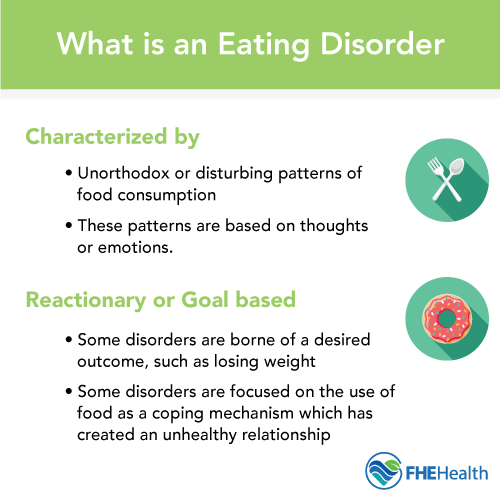Some Known Details About Eating Disorder Recovery
Wiki Article
The 8-Minute Rule for Eating Disorder Recovery
Table of ContentsGetting The Eating Disorder Recovery To WorkEating Disorder Recovery - An OverviewAn Unbiased View of Eating Disorder RecoveryThe 9-Minute Rule for Eating Disorder RecoveryThe smart Trick of Eating Disorder Recovery That Nobody is Discussing

Orthorexia is a form of eating problem, still unknown in the DSM, in which a person becomes obsessed with "healthy and balanced consuming." While lots of individuals emphasize to be aware of the ingredients as well as sourcing of their food, orthorexia can end up being harmful to the person's wellness. Orthorexia creates people to determine certain food or food groups as "appropriate," "healthy," or "pure." At some point, particular foods or entire groups are eliminated from the person's diet regimen; they may additionally start to obsess over the active ingredients in their foods, investing hours daily planning dishes (eating disorder recovery).
Food components could also come to be the person's just topic of discussion. Health repercussions might include a selection of intestinal and also nutritional inequalities. It can also trigger a number of the exact same health threats as anorexia nervosa, as the individual's caloric intake may be severely restricted. Orthorexia is likewise a typical co-occurring condition related to OCD.
The Eating Disorder Recovery PDFs
With this problem, an individual will strictly prevent particular foods to the detriment of their health - eating disorder recovery. Unlike orthorexia, nevertheless, the avoidance of certain foods isn't driven by notions of the food's healthiness or pureness, yet instead by a serious aversion to the food's flavor, texture, or smell (although problems regarding wasting or gastrointestinal disorder might additionally be existing).Gradually, increasingly more foods become illogical, resulting in an incredibly limited combination of appropriate foods. Previously referred to as discerning eating condition, ARFID commonly starts in childhood years and also considerably worsens over time. It's relatively typical for youngsters to be "particular eaters" and also every person has preferences for what they consume, but if it comes to be uncontrollable and destructive to an individual's health, it necessitates a check-in with an eating condition treatment professional.
Like orthorexia, an unfavorable or distorted body photo is not always a reason of the condition. ARFID is normally dealt with making use of talk treatment and also cognitive retraining such as Cognitive Behavior Modification (CBT). Unlike most eating disorders which typically first existing throughout adolescence, rumination condition is most common in infancy and early childhood years, although it can continue into the adult years.
The Definitive Guide to Eating Disorder Recovery
Generally, they do not experience tension or disgust when throwing up, neither do they appear to make an effort to vomit (as seen in bulimia nervosa). Rumination problem is often a reaction to an unreasonable concern of health problem triggered by consuming, although its reasons are much less well-understood than other eating sites conditions.

Orthorexia is a type of eating condition, still unrecognized in the DSM, wherein an individual ends up being obsessed with "healthy and balanced eating." While lots of people make a point to be mindful of the active ingredients as well as sourcing of their food, orthorexia can come to be detrimental to the individual's wellness. Orthorexia creates individuals to recognize particular food or food teams as "correct," "healthy and balanced," or "pure." At some point, specific foods or whole groups are removed from the person's diet regimen; they could additionally start to obsess over the ingredients in their foods, investing hrs every day preparation dishes.
The Ultimate Guide To Eating Disorder Recovery

With this condition, an individual will purely avoid particular foods to the hinderance of their health. Unlike orthorexia, nonetheless, the avoidance of particular foods isn't driven by ideas of the food's healthfulness or purity, however instead by a severe aversion to the food's taste, appearance, or odor (although problems about get more wasting or food poisoning might additionally exist).
Gradually, even more and more foods come to be illogical, causing an incredibly restricted scheme of acceptable foods. Formerly called selective eating disorder, ARFID usually begins in childhood years and gradually aggravates with time. It's fairly typical for youngsters to be "particular eaters" as well as everyone has preferences of what they eat, yet if it becomes uncontrollable and also damaging to an individual's health and wellness, it calls for a check-in with an eating problem therapy expert.
All about Eating Disorder Recovery
Like orthorexia, a negative or altered body photo is not always a reason of the condition. ARFID is typically dealt with making use of talk therapy and cognitive re-training such as Cognitive Behavior Modification (CBT). Unlike most eating problems which generally initially present throughout adolescence, rumination disorder is most usual in infancy and also very early youth, although it can persist into their adult years.Generally, they do not experience anxiety or disgust when throwing up, neither do they appear to make an initiative to throw up (as seen in bulimia nervosa). Rumination condition is typically a reaction Web Site to an unreasonable anxiety of ailment brought on by consuming, although its reasons are much less well-understood than various other eating conditions.
Rumination condition is noted in the DSM-V. Among the most dangerous types of consuming condition, ED-DMT1 (informally called diabulimia), occurs when an individual with type-1 diabetes intentionally avoids their insulin dosage to shed weight. Diabulimia is listed as one of the lots of unspecified consuming conditions under the catchall term OSFED (Various other Specified Feeding r Consuming Condition).
Report this wiki page